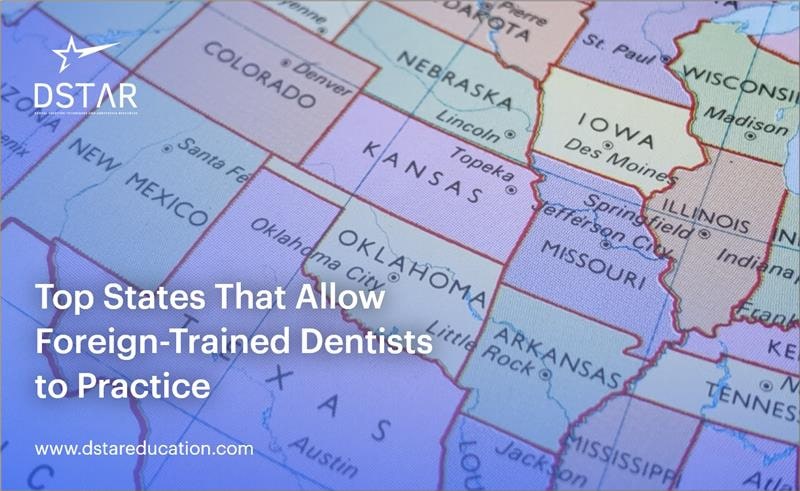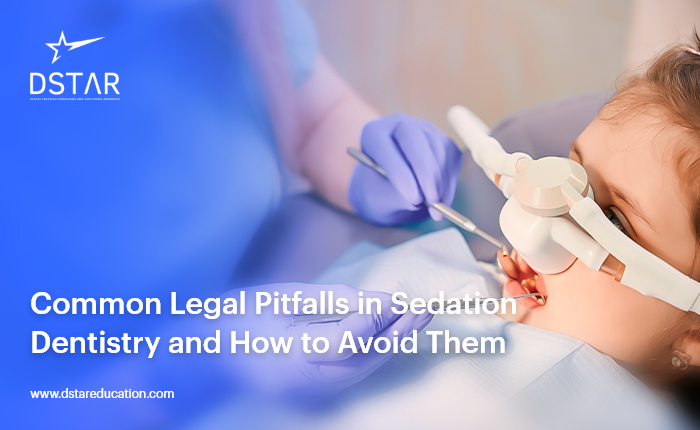Foreign trained dentists seeking licensure in the United States must navigate a complex regulatory landscape. Each state dental board maintains jurisdiction over its licensure processes, which include distinct criteria related to education, clinical training, examinations, and legal eligibility. For example, we have written a guide on Texas Dental CE Requirements for 2025, which you need to read.
This article identifies the top states that allow foreign trained dentists to practice while exploring the regulatory framework governing cross-state licensure, reciprocity, and jurisdictional variations in dental licensure requirements by state.
States That Allow Foreign Trained Dentists to Practice Without CODA Degrees
While most U.S. states require graduation from a Commission on Dental Accreditation (CODA)-accredited program, a select few offer provisional or limited licensure pathways for foreign trained dentists.
The following states maintain mechanisms enabling non-CODA graduates to engage in supervised or conditional clinical practice:
- California: Through its International Dental Program (IDP), the state evaluates equivalency and permits certain foreign graduates to complete qualifying programs at accredited institutions.
- Texas: Permits licensure through credential evaluation, followed by completion of a U.S.-based clinical examination.
These states that allow foreign trained dentists to practice implement oversight mechanisms, including jurisprudence exams and verification of non-U.S. credentials. Their policies facilitate workforce integration while upholding public safety and clinical standards.
What States Have Dental License Reciprocity for Foreign Trained Professionals?
Reciprocity remains limited for foreign trained dentists due to inconsistent educational benchmarks and clinical evaluation standards. However, some states have enacted conditional reciprocity provisions, primarily benefiting those who have obtained licensure in another U.S. jurisdiction post-IDP or advanced standing program completion.
- Colorado and Arizona: Recognize licenses from other U.S. states if the candidate meets experiential thresholds.
- Virginia: Permits licensure by credentials if the applicant holds a current dental license and meets continuing education and clinical practice duration benchmarks.
- Connecticut: Offers endorsement pathways that may accept foreign-trained practitioners who already possess valid U.S. state licenses.
Understanding which states have dental license reciprocity is critical for candidates aiming to relocate. These provisions typically require a demonstration of continuous active practice and adherence to moral character and jurisprudence criteria.
Must Read: Advantages of Group Discounts for Sedation Recertification in Texas
Can You Have a Dental License in Multiple States as a Foreign Trained Dentist?
Yes, foreign trained dentists may hold multiple licenses across different states; however, they must satisfy each jurisdiction’s unique regulatory conditions. No federal licensure system exists for dentistry in the U.S., so each state’s board sets its own standards.
To answer the question “Can you have a dental license in multiple states,” one must consider the following:
- Separate Applications: Each state requires the submission of an individual licensure application.
- State-Specific Exams: Jurisprudence examinations assessing knowledge of state laws are commonly required.
- Verification of Practice History: Some states mandate minimum active practice years in a previous U.S. jurisdiction before issuing licensure by credentials.
Comparative Dental Licensure Requirements by State
Dental licensure requirements by state exhibit considerable heterogeneity. Beyond educational and clinical thresholds, states differ on background checks, CPR recertifications, jurisprudence testing, and recognition of foreign credentials.
- New York: Requires completion of a CODA-accredited program but offers limited permits to foreign-trained faculty.
- Florida: Mandates graduation from a CODA-approved institution with no alternative pathways for foreign-trained dentists.
- Washington: Accepts foreign-trained applicants with advanced standing degrees and successful completion of the ADEX exam.
Strategic Considerations for Foreign Trained Dentists
Foreign trained professionals should prioritize states that allow foreign trained dentists to practice through defined, legally transparent pathways with Dental CE Courses. The presence of international dental programs, alternative licensure models, and reciprocity agreements significantly influences a candidate’s ability to enter clinical practice.
Dentists should also determine what states have dental license reciprocity with jurisdictions where they may already hold licensure. Furthermore, for those asking, “Can you have a dental license in multiple states,” strategic sequencing of licensure applications can minimize delays and maximize mobility.
Conclusion
Navigating dental licensure as a foreign trained dentist in the United States demands a deep understanding of state-specific regulations. From identifying states that allow foreign trained dentists to practice to interpreting what states have dental license reciprocity and evaluating whether one can hold licenses in multiple jurisdictions, each aspect plays a critical role in professional integration.
Given the disparities in dental licensure requirements by state, strategic planning, regulatory awareness, and documentation integrity remain paramount.
At DSTAR Education, we support dental professionals by offering state-approved continuing education, including all levels of sedation permit renewal in Texas, Jurisprudence training and free practice test, and BLS, ACLS, and PALS certifications.
References
- Texas State Board of Dental Examiners (TSBDE) – https://www.tsbde.texas.gov
- American Dental Association (ADA) – https://www.ada.org
- Commission on Dental Accreditation (CODA) – https://coda.ada.org
- Minnesota Board of Dentistry – https://mn.gov/boards/dentistry
- California Dental Board – https://www.dbc.ca.gov
- Illinois Department of Financial and Professional Regulation – https://idfpr.illinois.gov
- Colorado Dental Board – https://dpo.colorado.gov/Dental
- Virginia Board of Dentistry – https://www.dhp.virginia.gov/dentistry
 Take Free TSBDE Anesthesia Jurisprudence Practice Exam Now!
Take Free TSBDE Anesthesia Jurisprudence Practice Exam Now!












